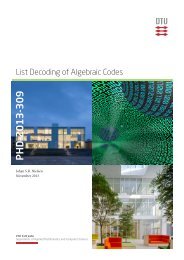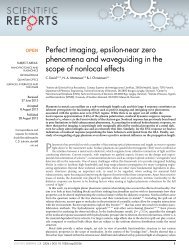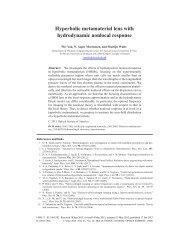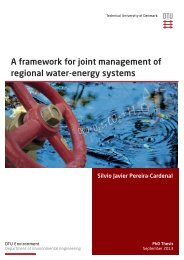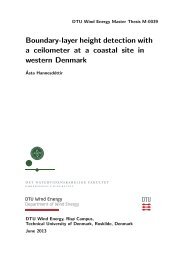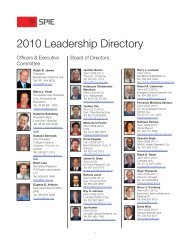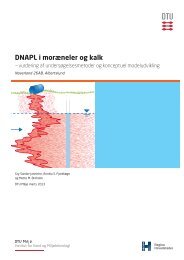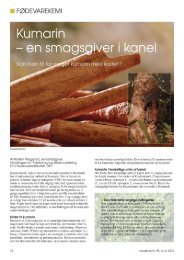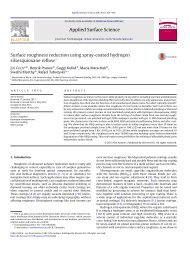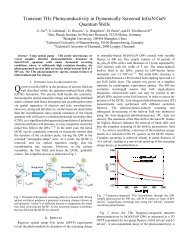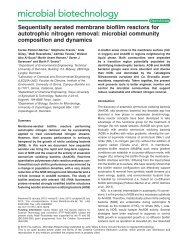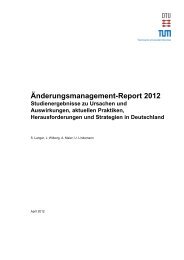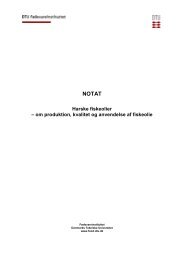PEC12-25 CAPEC-PROCESS Industrial Consortium ... - DTU Orbit
PEC12-25 CAPEC-PROCESS Industrial Consortium ... - DTU Orbit
PEC12-25 CAPEC-PROCESS Industrial Consortium ... - DTU Orbit
You also want an ePaper? Increase the reach of your titles
YUMPU automatically turns print PDFs into web optimized ePapers that Google loves.
<strong>CAPEC</strong><br />
Jason Price (JAPR)<br />
<strong>CAPEC</strong>-<strong>PROCESS</strong><br />
Alberto Quaglia (AQ)<br />
important in chemical process-product design. However, due to<br />
the increased complexity of the molecular structures of<br />
chemicals, their wider applications, and demands for greater<br />
accuracy, extension and analysis of the current prediction<br />
methods as well as development of new models are necessary.<br />
Therefore, the combination of group-contribution (GC) and<br />
atom connectivity (CI) (the GC Plus approach) that is able to<br />
extend the application range of the host property model has been<br />
developed and extended to predict the UNIFAC GC-model<br />
parameters (see PEC09-17). The objectives of this PhD-project<br />
is to analyze the performance of the GC Plus approach in VLE and<br />
SLE calculations and based on it, to extend and further develop<br />
the GC Plus approach for other versions of the UNIFAC models<br />
and to apply the models for chemical process synthesis and<br />
design.<br />
Supervisors: RaG, GK<br />
Start: 01-04-2009; End: 31-09-2012<br />
Research area: A, B, C<br />
Operation and Control of Enzymatic Biodiesel Production<br />
This work explores the control of biodiesel production via an<br />
enzymatic catalyst. Currently enzymatic catalysts are not in<br />
widespread use for commercial-scale biodiesel production. This<br />
is mainly due to non-optimized process designs. Furthermore is<br />
it unclear what process variables need to be monitored and<br />
controlled to ensure optimal economics. Critical to the project is<br />
to develop a control methodology to optimize the productivity<br />
of biodiesel production. The implementation of a control system<br />
to handle changes in the feed composition and the correct<br />
dosing of alcohol can potentially lead to very large energy<br />
savings and at the same time provide a more consistent product<br />
quality. However given most conversion and quality analyses of<br />
biodiesel are commonly done by chromatographic methods,<br />
suitable measurement techniques will need to be investigated to<br />
obtain real-time information on the states of the system.<br />
The main deliverable is a steady state and dynamic simulation<br />
model of the process including a strategy for monitoring and<br />
process control. This model and the proposed strategies will be<br />
validated experimentally on the department’s pilot facilities.<br />
Supervisors: JW, JKH, MAN<br />
Start: 01-09-2011; End: 01-10-2014<br />
Research area: B, D<br />
Incremental refinement of process design<br />
Process Simulation is not common in the food and biofuels<br />
industries, mainly due to the complexity of thermodynamics and<br />
transport properties of the species involved.<br />
37



